Demolition Contractors Belleville
Find Demolition Contractors in Belleville
Get 3 FREE Building Demolition quotes for your project today! Compare profiles, reviews, accreditations, portfolio, etc... and choose the best service.

Torshel Tornado Shelters & Safe Rooms
53 reviewsBrick, USThe fastest way to get your storm shelter is by selecting the product or products of your interest. Then, proceed to fill out the contact form online, and a sales representative will be in touch with you. The installation time for the above and in-ground units is 1-3 weeks, depending on your location. Commercial building installation time is 3-6 weeks, depending on the size and your location. If you are building a house, make sure that you order your storm shelter ahead of time. Thank you very much, stay safe! Financing Options We’ve Been Protecting Families & Businesses For Over 9 Years Buying a storm shelter is an important decision. Torshel is committed to helping you choose the best type of shelter for both your home and budget. Both underground shelters and safe rooms offer maximum protection for storms. We encourage our clients to compare the quality of our shelters, methods of installation, and the reputation of the companies. There have been a few cases where other companies have poorly installed in-ground shelters that slip out of the ground. As a result, people can be terribly injured, and in some cases, death may occur. Some companies put profit over the lives of those who will use their products. At Torshel we work to make sure that we save and help protect as many lives as possible. We only install the highest quality storm shelters available in the market and stand behind our work by offering a 10-year warranty. We make ourselves available before and after the shelter’s installation. Commercial and Residential Storm Shelters Welcome to Torshel Storm Shelters, a leading company in the storm shelter and safe room industry. We have the best products, at an affordable price. We proudly install and serve Alabama, Arkansas, Florida, Kentucky, Louisiana, Mississippi, Tennessee, Texas, Georgia, and surrounding states. However, we sell, and ship storm shelters anywhere in the United States. We have clients in Dallas, New York, Miami, Seattle, Los Angeles, and many rural areas around the country. Enjoy your visit to our website. Take a look at our videos, pictures, and testimonials from multiple clients. We know this is an important decision. Know that if you chose us, you will get great customer service and a top-of-the-line storm shelter backed by a 10-year warranty. Torshel offers discounts to customers who purchase two or more units. Protect your family with a Torshel shelter manufactured to withstand EF5 category tornadoes. Torshel offers underground storm shelters and above-ground safe rooms of various sizes that meet or exceed FEMA’s stringent safety standards. Our tornado shelters are also more durable than traditional storm cellars. Let your neighbors, coworkers, and friends know about your purchase of your storm shelter. If they want to buy one during the same delivery and installation trip, everyone can save a lot. A case in point, Mr. Kyle told Mr. Will about his new in-ground shelter; Will liked the product and decided to purchase one. Torshel delivered and installed two units, and offered them discounts! John and George partnered installing a big shelter in-between their houses, both saved and both of their families can have direct access to the shelter. Commercial Storm Shelters The most valuable asset of any company is not its facilities, machines or products. It’s their team of employees, executives, and clients. Torshel can help protect them while at work with a commercial multipurpose storm shelter, panic room, and safe vault in the event of a tornado, hurricane, robberies, shootings, and other types of incidents that may put in danger their safety. You, your staff, and clients will have a peace of mind by having a steel safe room ready for any threating occasion. Storm Shelter in your Garage Torshel storm shelters are made of structural heavy-duty steel and are one of the bests available in the United States. Our storm shelters are well constructed and properly anchored. Such units will withstand an EF5 tornado according to engineers and professionals at Texas Tech University. They are the perfect solution for the elderly, people with disabilities, claustrophobia, and clients who want an easy to reach safe room in their garage. Inground Tornado Shelters For clients that live in mobile homes, or do not have a garage, we offer underground outdoor shelters. These underground units reflect Torshel’s latest technology. They come with a 13” x 13” bullet-resistant window made of 1.5” polycarbonate. The window allows natural light to flow inside the shelter. You won’t feel entrapped. Torshel’s Newest and High Technology Feature! 4-6 cubic yards of 3,000 PSI concrete will keep the unit inside the ground and prevent it from floating. Let’s Keep Your Family Safe The sooner the better, fill our online form and one of our talented representatives will contact you to help you with any question you might have.
- Services
- Why Us?
- Testimonials
- Gallery
Get Quote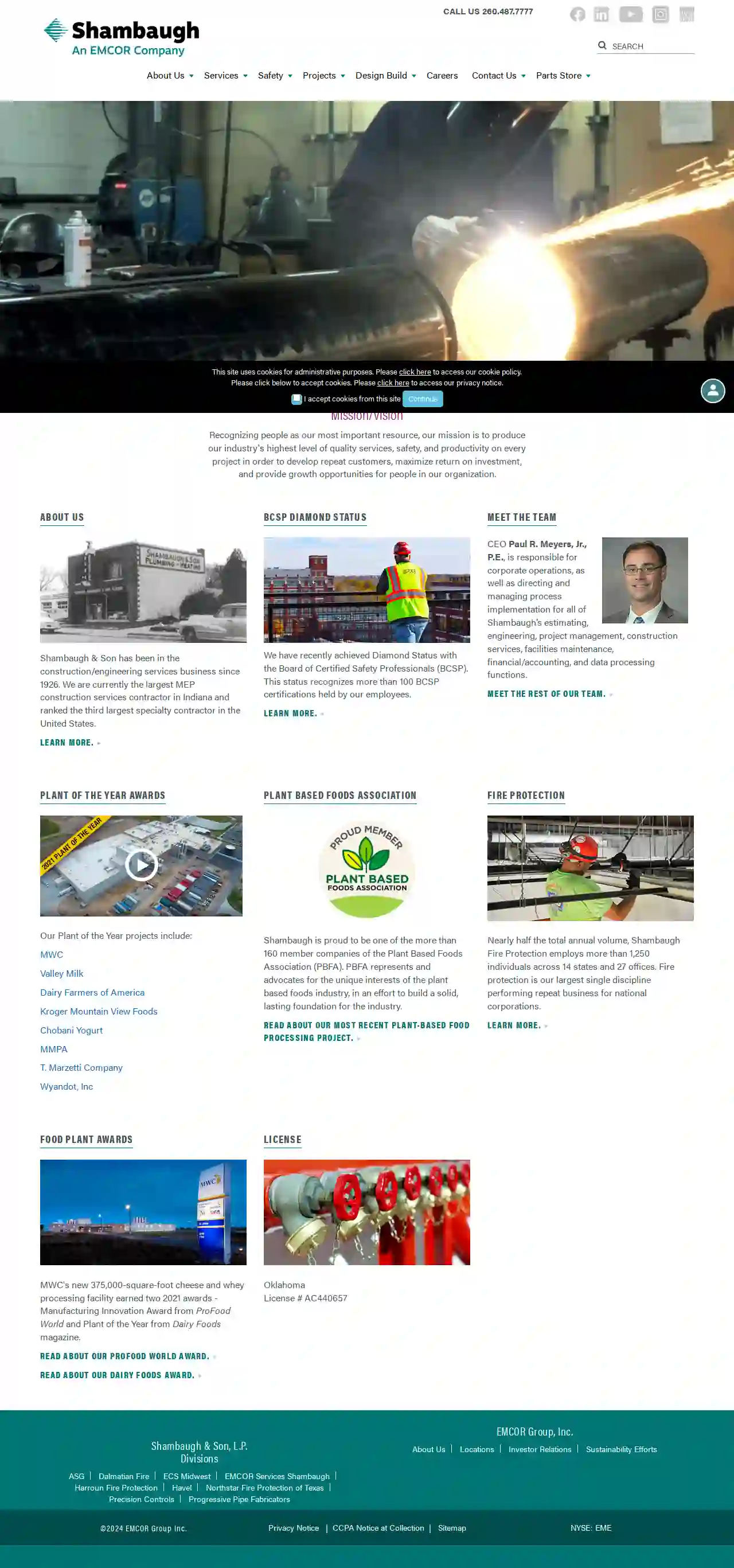
Shambaugh & Son, L.P.
4.287 reviewsWayne, USMission/Vision Recognizing people as our most important resource, our mission is to produce our industry's highest level of quality services, safety, and productivity on every project in order to develop repeat customers, maximize return on investment, and provide growth opportunities for people in our organization. About Us Shambaugh & Son has been in the construction/engineering services business since 1926. We are currently the largest MEP construction services contractor in Indiana and ranked the third largest specialty contractor in the United States. BCSP Diamond Status We have recently achieved Diamond Status with the Board of Certified Safety Professionals (BCSP). This status recognizes more than 100 BCSP certifications held by our employees. Meet the Team CEO Paul R. Meyers, Jr., P.E., is responsible for corporate operations, as well as directing and managing process implementation for all of Shambaugh’s estimating, engineering, project management, construction services, facilities maintenance, financial/accounting, and data processing functions. Plant of the Year awards Our Plant of the Year projects include: MWC Valley Milk Dairy Farmers of America Kroger Mountain View Foods Chobani Yogurt MMPA T. Marzetti Company Wyandot, Inc plant Based foods association Shambaugh is proud to be one of the more than 160 member companies of the Plant Based Foods Association (PBFA). PBFA represents and advocates for the unique interests of the plant based foods industry, in an effort to build a solid, lasting foundation for the industry. fire protection Nearly half the total annual volume, Shambaugh Fire Protection employs more than 1,250 individuals across 14 states and 27 offices. Fire protection is our largest single discipline performing repeat business for national corporations. Food Plant Awards MWC's new 375,000-square-foot cheese and whey processing facility earned two 2021 awards - Manufacturing Innovation Award from ProFood World and Plant of the Year from Dairy Foods magazine. LICENSE Oklahoma License # AC440657 Shambaugh & Son, L.P. Divisions ASG Dalmatian Fire ECS Midwest EMCOR Services Shambaugh Harroun Fire Protection Havel Northstar Fire Protection of Texas Precision Controls Progressive Pipe Fabricators EMCOR Group, Inc.
- Services
- Why Us?
- Our Team
- Gallery
Get Quote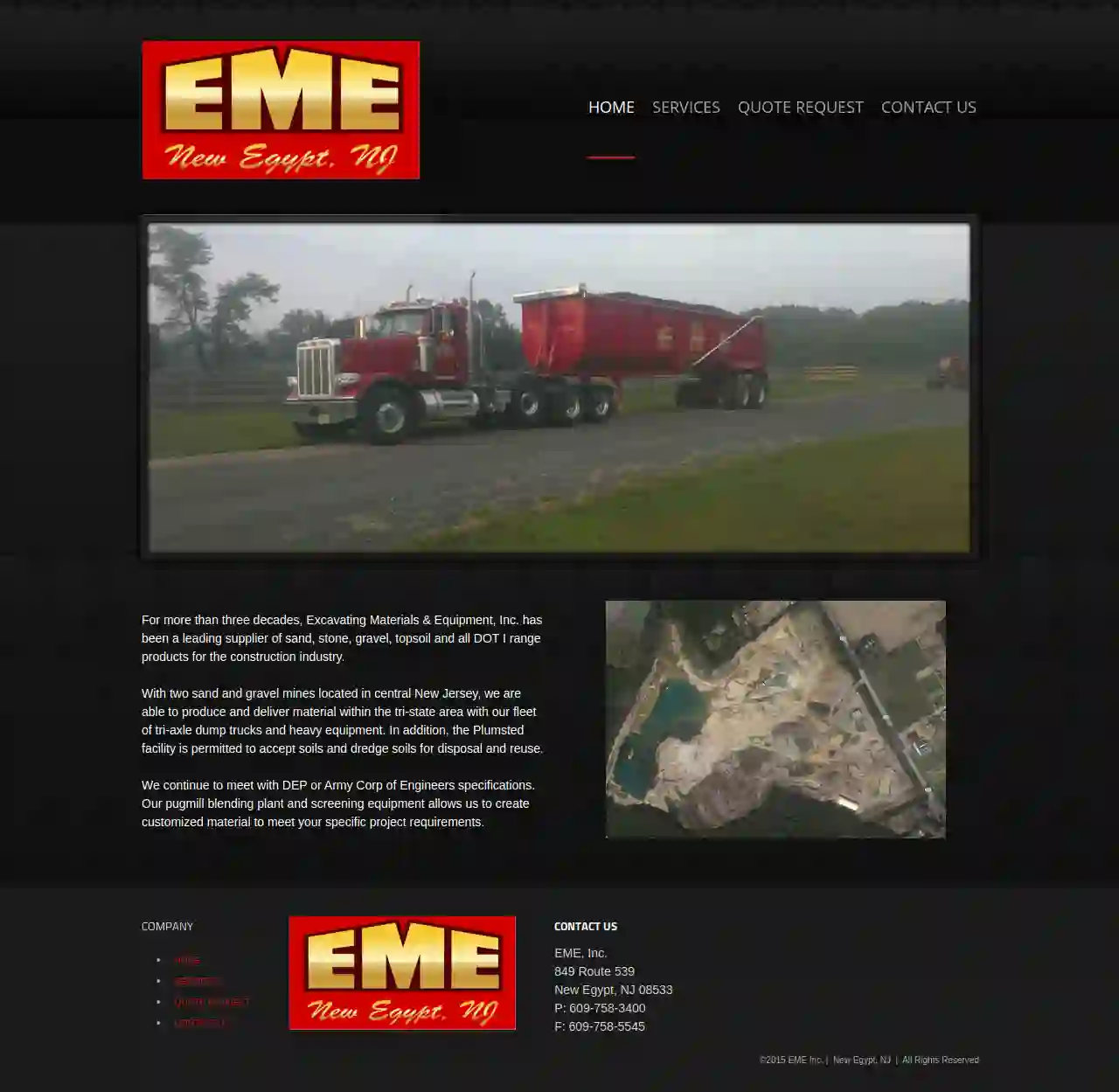
Excavating Materials & Equipment, Inc.
37 reviews849 Route 539, New Egypt, 08533, USExcavating Materials & Equipment, Inc. (EME) For over three decades, EME has been a leading supplier of sand, stone, gravel, topsoil, and DOT I range products for the construction industry in central New Jersey. We operate two sand and gravel mines, ensuring we can efficiently produce and deliver materials within the tri-state area using our fleet of tri-axle dump trucks and heavy equipment. Our commitment to quality extends beyond material supply. The Plumsted facility is permitted to accept soils and dredge soils for disposal and reuse, adhering to strict DEP and Army Corp of Engineers specifications. Our pugmill blending plant and screening equipment allow us to create customized materials tailored to your specific project requirements.
- Services
- Why Us?
- Gallery
Get Quote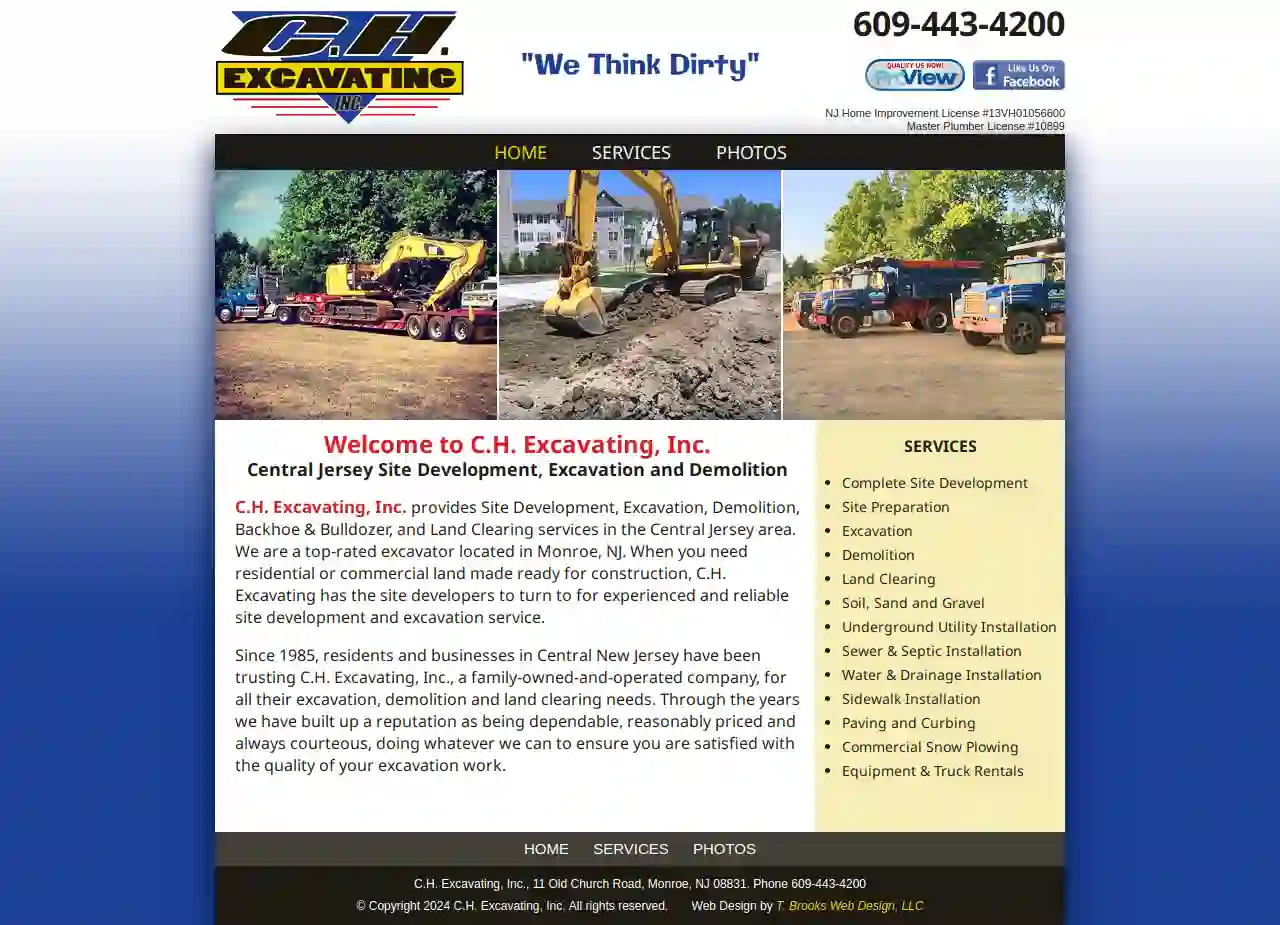
C H Excavating Contractors Inc
53 reviews11 Old Church Road, Monroe, 08831, USWelcome to C.H. Excavating, Inc. Central Jersey Site Development, Excavation and Demolition C.H. Excavating, Inc. provides Site Development, Excavation, Demolition, Backhoe & Bulldozer, and Land Clearing services in the Central Jersey area. We are a top-rated excavator located in Monroe, NJ. When you need residential or commercial land made ready for construction, C.H. Excavating has the site developers to turn to for experienced and reliable site development and excavation service. Since 1985, residents and businesses in Central New Jersey have been trusting C.H. Excavating, Inc., a family-owned-and-operated company, for all their excavation, demolition and land clearing needs. Through the years we have built up a reputation as being dependable, reasonably priced and always courteous, doing whatever we can to ensure you are satisfied with the quality of your excavation work.
- Services
- Why Us?
- Gallery
Get Quote
PACE Excavating LLC.
4.922 reviews80 Payne Field Rd, West Point, 39773, USThe PACE Story PACE Excavating was formed as an LLC in 2011 by Seth Wedel and Troy Jantz. As teenagers in the '80s, both learned dirt construction alongside their fathers, Galen Wedel and Ronnie Jantz. Both families had been farmers and after a change in market conditions needed to find another way to make a livelihood. The Wedel’s started their operation by pulling a small dirt pan home from the Mississippi Delta behind a single-cab pickup truck. Holding customer satisfaction as a top priority and dedication to learning and growing became the foundations of both families operations. Brothers Shannon Wedel and Gabriel Wedel soon joined the Wedel’s operation to create a strong family business. Over the years the two teams often worked side by side, subcontracting together. Many long hours working all across Mississippi and into Arkansas, Alabama and Tennessee gave them a wealth of experience and knowledge. Working with a large variety of contractors and all kinds of projects from roads to subdivision and site development to ponds and landfills, this team has become unparalleled in their knowledge of dirt and different soils and how to put it where you want it! When Seth and Troy made the decision to join forces, more than 75 years of combined experience came together. Third generation Carson Wedel joined the team soon after. The families enjoyed working together and anticipation of many years creating together. That dream changed directions when Troy lost an earthly battle with cancer and became the company’s heavenly partner at age 40. The company proudly carries his choice of name PACE Excavating. Our motto continues to be P-A-C-E. Pace Projects Completed Safe Days of Operation Achieve We are proud to be a strong team creating strong culture that offers you the highest level of service. Create Next Steps.... Give us a call today. We will be glad to get you a quote or answer questions you have. Excel Get a Quote
- Services
- Why Us?
- Our Team
- Gallery
Get Quote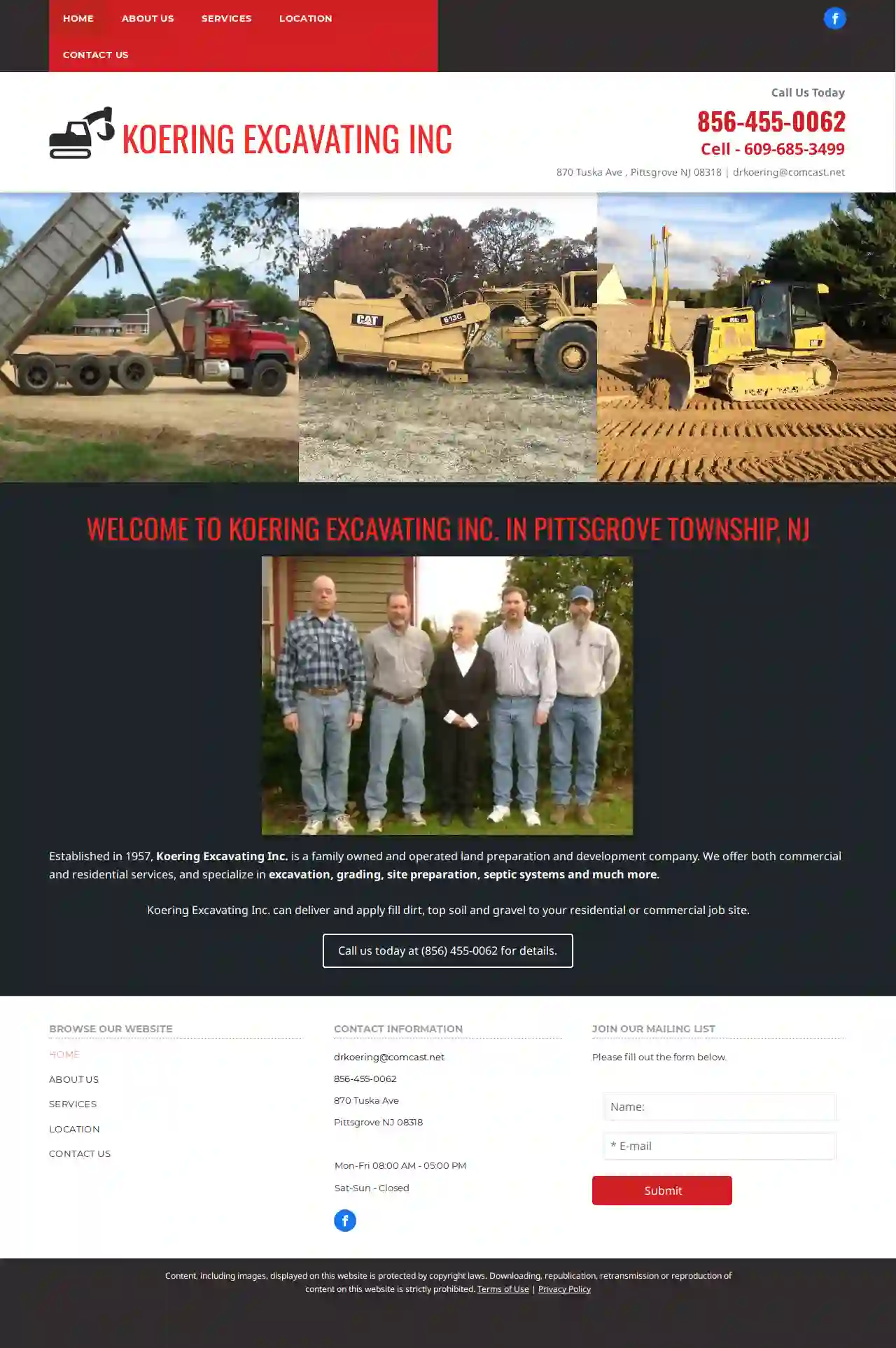
Koering Excavating Inc.
870 Tuska Ave, Pittsgrove, 08318, USAbout Koering Excavating Inc. Established in 1957, Koering Excavating Inc. is a family-owned and operated land preparation and development company. We take pride in our 59 years of service to the greater Pittsgrove Township area. With an eye for detail and our focus on safety, we offer our services to our residential, commercial, and municipal community. We have the industry experience and equipment to get the job done safely and on time the first time. We offer both commercial and residential services, and specialize in excavation, grading, site preparation, septic systems, and much more. Koering Excavating Inc. can deliver and apply fill dirt, top soil, and gravel to your residential or commercial job site. Our Heavy Duty Equipment Includes: Front End Loader Bull Dozier Dump Truck Back Hoe Excavator Plainer
- Services
- Why Us?
- Gallery
Get Quote
Will Jackson's Grading
31 reviews1358 New Mexico 313, Algodones, 87001, USWill Jackson's Grading: Your Trusted Partner for Excavation and Grading in Central New Mexico When you're ready to build on a piece of property or need help preparing land that already has a structure on it, contact Will Jackson's Grading. Whether you need an excavating contractor to assist you with trenching or a grading contractor to smooth things over, you'll always get outstanding services with us. Proper land preparation requires backhoes, loaders and dump trucks to complete the process within your timeline. Contact us when you need: Grading services to prepare your land for construction Trenching services to prepare for utility and plumbing installation Demolition, including complete and partial structure removal Site preparation, including erosion control services We're a locally-owned and operated family-run business with decades of experience. We pride ourselves on consistent communication, professional and reliable contracting services, and serving the central New Mexico area.
- Services
- Why Us?
- Gallery
Get Quote
Fox Contractors Corp
4.618 reviews5430 W. Ferguson Road, Fort Wayne, 46809, USWe can dig it. To get a job done right, you need to start with someone who really knows what they’re doing. That’s Fox Contractors. Decades of laying the groundwork Since 1948, we’ve been behind projects in and around Indiana that require specialized support with earthmoving and underground utilities. Our expertise can be found on jobs that range from heavy highway and public works to commercial and industrial site development. View Our Certifications Minority Business Enterprise Indiana Veteran Owned Small Business Enterprise Veteran Owned Business After more than 70 years in business, we’ve built a reputation for impeccable work that’s done on time and on budget. That, along with our fair pricing and highly skilled, safety-conscious workforce make us the first choice for project managers who are looking for a reliable partner. Our clients include DOTs, municipalities, general contractors and developers, and we have experience in the healthcare, education and environmental fields. Fox Contractors is proud to be a certified Minority Business Enterprise (MBE) and a 100% signatory contractor with the IUOE, Teamsters and Laborers’ unions. With a headquarters in Fort Wayne and a regional office near Indianapolis, Fox Contractors serves customers across the region and is prequalified with the Indiana, Michigan and Ohio Departments of Transportation. We take care of business – from the ground up. ”Fox places a high value on safety because our people are our #1 asset. We strive to minimize or eliminate hazards all together, so that all employees can work in a safe environment, without losing time. Our safety-first approach is reflected in our extensive training and education, as well as an employee safety commitment that starts from the top down.” Dallas Day, Owner, Fox Contractors Corp.
- Services
- Why Us?
- Testimonials
- Gallery
Get Quote
Roy Anderson Corp
4.128 reviews11400 Reichold Road, Gulfport, 39503, USAbout Roy Anderson Corp Roy Anderson Corp is an innovative construction company with unique strengths, committed to delivering unsurpassed customer service and performance to customers, creating exciting opportunities for associates and bound together by shared core beliefs of safety, quality and integrity. Since 1955 Roy Anderson Corp has delivered exceptional construction services including Preconstruction, Design-Build, General Contracting and Construction Management. We are a wholly owned subsidiary of Tutor Perini Corporation (NYSE: TPC) who is consistently ranked among the top builders in the United States by Engineering News Record.
- Services
- Why Us?
- Gallery
Get Quote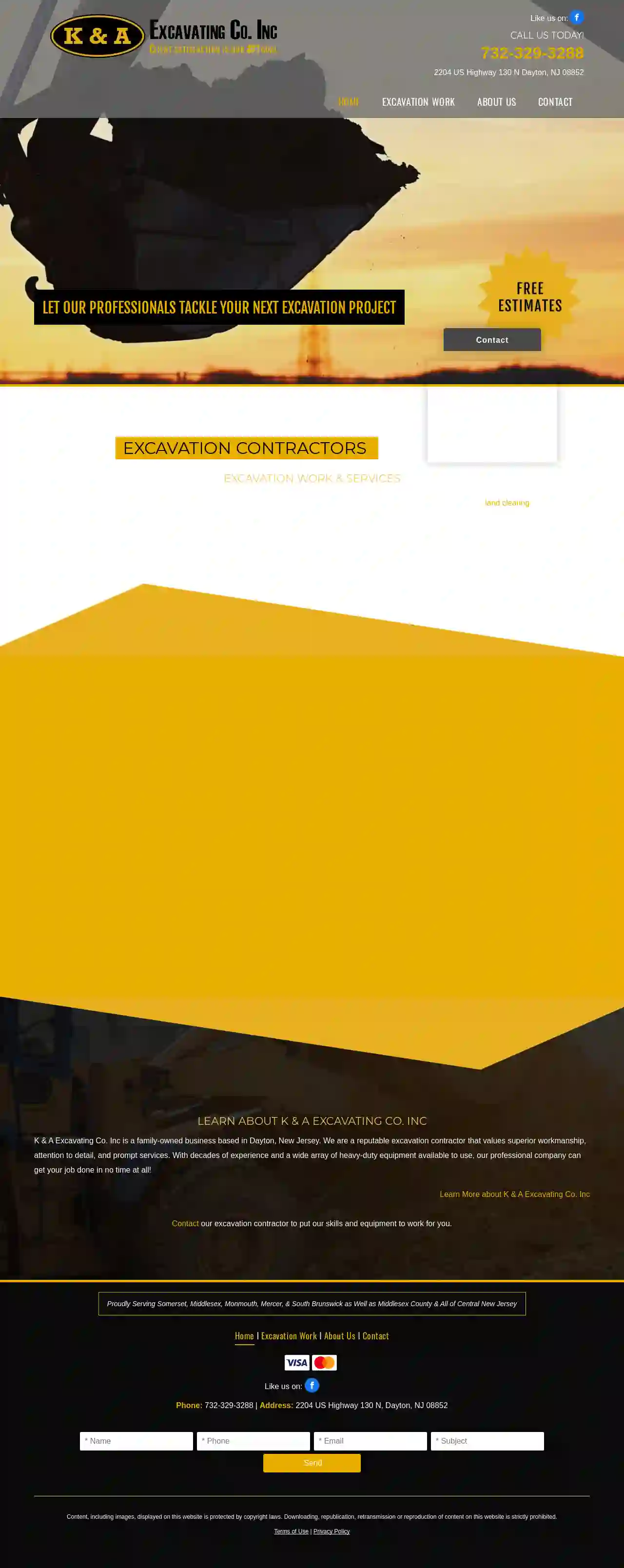
K & A Excavating Co Inc.
4.522 reviews2204 US Highway 130 N, Dayton, 08852, USAbout K & A Excavating Co. Inc K & A Excavating Co. Inc is a family-owned business based in Dayton, New Jersey. We are a reputable excavation contractor that values superior workmanship, attention to detail, and prompt services. With decades of experience and a wide array of heavy-duty equipment available to use, our professional company can get your job done in no time at all! At K & A Excavating Co. Inc, we have built our reputation on our commitment to providing quality service, which has earned us many valuable customers. With more than 30 years of experience, we are the go-to company for customers when they're in need of asphalt removal, land clearing, or site preparation. Our company uses only the best equipment for each job. In addition, we maintain a skilled staff to perform all projects. They are more than happy to answer any of your questions regarding our services. K & A Excavating Co. Inc's mission is to provide customers with courteous and friendly service and quality workmanship. Request a free estimate from us today for your project!
- Services
- Why Us?
- Gallery
Get Quote
Over 22,076+ Excavation Companies in our network
Our excavation contractors operate in Belleville and surroundings!
ExcavationHQ has curated and vetted the Best Excavation Contractors arround Belleville. Find the most reliable pro today.